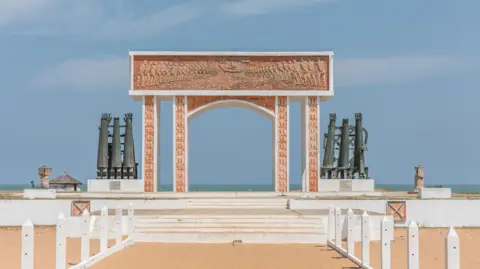
Benin has appointed renowned American filmmaker Spike Lee and his wife, Tonya Lewis Lee, a seasoned producer and author, as its ambassadors for African-Americans in the US.
The couple are expected to serve as “thematic” ambassadors, raising awareness and supporting initiatives to promote Benin’s ties with people of African descent.
The agreement was finalised during their visit to Cotonou, Benin’s capital, last week, French public broadcaster RFI reports.
The government says it will help reconnect “people of African descent around the world to their historical, cultural, and spiritual roots”.
The West African country also hopes the move will promote cultural tourism. It has come up with several initiatives encouraging people of African descent to reclaim their heritage and pursue citizenship where eligible.
Last year, the government passed a law offering nationality to people with an African ancestor who was taken from their homeland as part of the transatlantic slave trade.
The appointment of the ambassadors follows the recent launch of a website where the descendants of enslaved Africans can apply for citizenship.
RFI reports that Tonya Lewis Lee was among hundreds of people who applied and received a favourable response. She was in Benin last year.
In 2019, Ghana launched what it called the “Year of Return” to encourage people of African heritage to go back to the continent.
Spike Lee has previously stated that DNA analysis traced his father’s lineage to Cameroon, while his mother’s roots were from Sierra Leone. His wife’s specific country of ancestry has not been made public.
Both have long been advocates for civil rights and social justice in the US in their works. Spike Lee’s films are often based on African-American experiences and explore themes of race, identity, and justice.
The Benin government said that “through their long-standing commitment to justice, their exceptional creativity, and their global reach”, both have “profoundly shaped the contemporary narrative of the African diaspora”.
They have not publicly commented about their appointment.
On the streets of Cotonou, the move has generally been well received.

Student architect Prospère Yehoume, 27, told the BBC it was a “strong cultural message, which could be good publicity for Benin”.
Carlos Biogbé, who works in marketing, saw a huge opportunity, saying it could encourage actors and directors to make films in the country.
Secondary school student Basilia Hinvi agreed that it was a good move but questioned why famous US-Beninois actor Djimon Hounsou was not named.
Benin’s coastline is part of what was once known as the Slave Coast – a major departure point for enslaved Africans shipped across the Atlantic Ocean to the Americas.
Between 1580 and 1727, the Kingdom of Whydah, a major slave-trading centre located on what is now Benin’s coast, is estimated to have exported more than a million Africans to the US, the Caribbean and Brazil.
- President Commissions 36.5 Million Dollars Hospital In The Tain District
- You Will Not Go Free For Killing An Hard Working MP – Akufo-Addo To MP’s Killer
- I Will Lead You To Victory – Ato Forson Assures NDC Supporters
Visit Our Social Media for More




